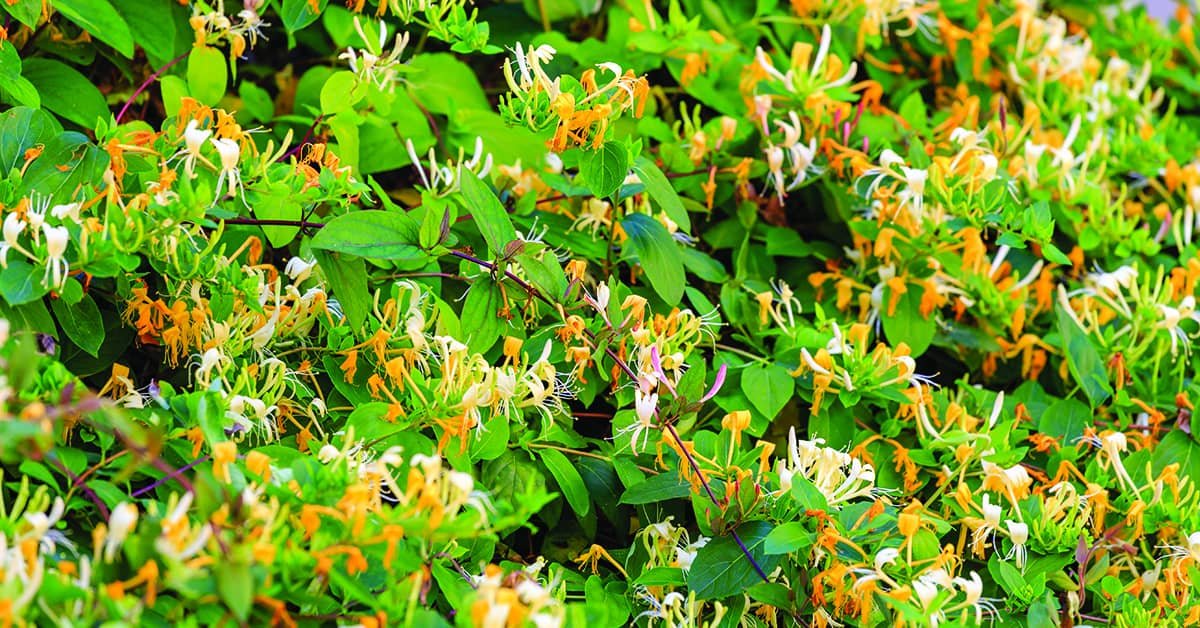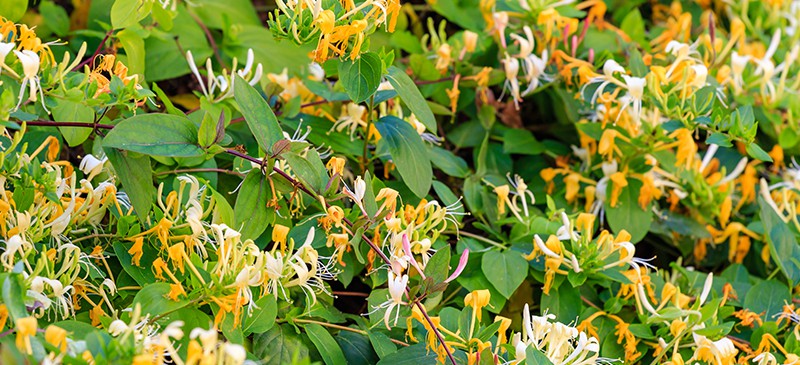Eating honeysuckle as a child probably evokes some happy memories. But did you know that there’s more to this beautiful flower than its sweet taste and wonderful aroma? Honeysuckle actually has amazing health benefits. The flowers, seeds, and leaves of this plant have many medicinal uses.
What can honeysuckle be used for? The applications are wide-ranging and include:
- Upper respiratory infections such as colds, flu, and pneumonia
- Other viral or bacterial infections
- Digestive disorders such as pain and inflammation in the small intestine (enteritis)
- headache and fever
- Urinary diseases
- Diabetes
- arthritis
What is honeysuckle?
Honeysuckle (Lonicera) is a common garden plant with highly fragrant flowers. There are hundreds of species around the world that grow primarily in temperate climates.all plants belong to the genus Lonicera of Caprifoliaceae.
Does honeysuckle smell good? You probably already know the answer to this question. It smells like a sweet floral perfume and I always enjoy smelling honeysuckle. It may be surprising that this well-known plant actually has many potential health benefits as well.
health benefits
1. Anti-inflammatory and antioxidant effects
Although not all honeysuckle berries are safe to consume, Honeysuckle Caerulea Contains edible berries that research studies have shown to have powerful and impressive health properties. First, it is extremely rich in disease-fighting antioxidants. Another 2017 study using animals found that Journal of Agricultural and Food Chemistry refers to the ability of Honeysuckle Caerulea Berry polyphenols regulate inflammation. Since we know that inflammation is at the root of most diseases, this could have even more potential benefits.
2. Improving immunity and antiviral effect
Honeysuckle (honeysuckle) is a variety commonly used in traditional Chinese medicine. It has yellowish white flowers and black fruits. A 2018 research study demonstrated that these honeysuckle berries have the ability to aid immune system function. This berry acted as an immunomodulator in immunosuppressed mouse subjects and was able to significantly increase natural killer cell activity. Natural killer cells (also known as NK cells) are a type of white blood cell that has the ability to kill viruses and tumor cells.
3. Natural scent
Like neroli essential oil, honeysuckle scent is a wonderful natural perfume in its own right. Pure honeysuckle essential oil can be difficult to find, but if you can find it, mixing it with a small amount of a carrier oil like coconut oil creates a wonderfully personal scent. It’s also an uplifting addition to diffusers, baths, DIY cleaning products and linen sprays.
4. Oral health
Honeysuckle is sometimes used as an ingredient in natural mouthwashes and mouthwashes because of its astringent and antibacterial properties. To make homemade mouthwash, mix two cups of water and half a cup of fresh honeysuckle leaves and bring to a boil. Once the mixture boils, reduce the heat and simmer for another 5 minutes. Of course, do not put it in your mouth until it has completely cooled down.
5. Diabetes
A study published in 2015 revealed that honeysuckle has the potential to help people with type 2 diabetes.managed by researchers honeysuckle It was administered to diabetic rats at a dose of 100 mg/kg for 4 weeks. After 4 weeks of this treatment, honeysuckle Reduced high blood sugar levels and insulin resistance in animal subjects. Overall, the study results demonstrate the antidiabetic effects of this species of honeysuckle in type 2 diabetic rats.
Another research study published in 2014 found that honeysuckle It has strong anti-inflammatory abilities that reduce the severity of diabetic nephropathy. Extracts of the above-ground parts of the flower suppressed the problematic inflammatory response that leads to nephropathy.
6. Arthritis
The aforementioned anti-inflammatory and antioxidant properties of honeysuckle seem to make it a natural remedy that may help people suffering from arthritis.Research results published in Functional food journal Highlights the phenolic compounds found in the fruit. Honeysuckle Caerulea plant.
This study will be administered orally Honeysuckle Caerulea When the extract was administered to animal subjects suffering from adjuvant-induced arthritis, suppression of inflammatory enzyme production in the spleen was observed. Beneficial antioxidant enzymes such as superoxide dismutase (SOD) and glutathione peroxidase (GPx) were also recovered after administration of the extract, and transaminases (often referred to as liver enzymes) were inhibited. This is important because elevated liver enzymes are common in patients with various types of arthritis, including rheumatoid arthritis and psoriatic arthritis.
Use in traditional medicine
In Traditional Chinese Medicine (TCM), honeysuckle flowers are connected to the lung, stomach, and large intestine meridians. It is also believed to have a cold effect and is an excellent natural remedy to remove heat and toxins from the body. TCM practitioners use this flower both internally and externally for a variety of health conditions, including skin infections, ulcers, fevers, and inflammatory conditions.
Native Americans were known to boil fresh honeysuckle leaves in water and use them on wounds to promote wound healing.
Disadvantage
Is honeysuckle poisonous? Honeysuckle leaves and stems contain saponins, which can be dangerous if ingested in large quantities, so caution should be taken when consuming them in general.
Although honeysuckle is not generally considered to be highly toxic, it is important to ensure that you and your pet do not ingest poisonous types of honeysuckle. Ingesting large amounts of the toxic parts of the plant can cause serious illness. If you think you or your pet has ingested a poisonous plant of any kind, seek emergency medical care immediately if necessary. You can also contact the National Poison Control Center at 1-800-222-1222 for more information.
Most honeysuckles are native to North America, but some are imported from Asia. Asian varieties such as honeysuckle (Ronsiella japonica) is considered invasive in many states in the United States and can crowd out other plants. Will honeysuckle kill a tree? Ronsiella japonica They can also grow densely around the trunk of a tree, potentially killing the tree.
Honeysuckle vs. Jasmine vs. Catnip vs. Poison Sumac
Both honeysuckle and jasmine grow as vines and give off a wonderful natural fragrance. There are several edible seeds of honeysuckle, but only jasmine is edible. sambac jasmine. All other types of jasmine are poisonous. Like honeysuckle, jasmine scent is used in many cosmetic products.
It may seem strange to compare honeysuckle and Actinidia, but honeysuckle can be an alternative to this herb that drives many, if not all, cats crazy. Honeysuckle is known to elicit reactions in cats that do not respond to Actinidia. The specific cat-loving breeds are: Honeysuckle Tatarica Or Tatarian honeysuckle.
Both honeysuckle and sumac can grow invasively in North America. Although sumac is generally considered to have always been toxic to humans, many types of honeysuckle have been safely used both internally and externally for centuries.
Where to find it and how to grow it
If you can’t find fresh honeysuckle, you can find dried varieties at Asian markets or online herb suppliers. There are also places in health stores where you can find honeysuckle in the form of powder, decoction and decoction.
Growing and caring for honeysuckle is very simple. Physically speaking, honeysuckle has two main types. A vine or creeper and a honeysuckle shrub/shrub. Vining plants grow best in fertile, moist, well-drained soil and will produce more flowers if the top of the vine receives full sun. Honeysuckle shrubs grow well in well-drained soil, but can also be planted in full sun or partial shade.
If you want to attract hummingbirds to your garden, coral honeysuckle is a great choice. This type of honeysuckle vine has green leaves and coral-colored flowers. Coral honeysuckle also bears bright red honeysuckle fruit. Cape honeysuckle is another option that can be grown with brightly colored flowers that attract hummingbirds and butterflies. Bush honeysuckle is a shrub that grows up to 20 feet tall with flowers that range from white to yellow to red. If you want a plant that yields edible fruit, the sweetberry honeysuckle (Lonicera caerulea) shrub is a great choice. It grows best in full sun in zones 2 through 7.
If you don’t have a lot of space, some types of honeysuckle will grow well in containers as long as they have enough water and plant food. Don’t forget to provide a trellis for container vines or hang your plants in baskets. Pruning is a good practice to promote honeysuckle growth.
How do you prune honeysuckle? Basic pruning can be done by cutting off the dead parts of the vine using sharp pruning shears. Once the flowers bloom in the spring, use pruning shears to cut off the tips of the stems. This will encourage growth during the next flowering season.
recipe
What kinds of honeysuckle are edible? The following varieties are edible. honeysuckle, Honeysuckle pericrymenum and Honeysuckle Siriosa.
To make honeysuckle tea, pour 1 cup of boiling water over 1 tablespoon of dried flowers.
Other delicious recipes using honeysuckle:
interesting facts
Flower essences, or flower remedies, are decoctions made from the flowering parts of plants. As a flower essence, honeysuckle is thought to be helpful if you want to let go of old memories and move forward in life. People who use flower essences also say this is a flower that helps them age gracefully and become more courageous. Due to its lovely scent, honeysuckle is often used as a fragrance in various cosmetic products such as lotions, soaps, and perfumes.
Risks and side effects
At this time, there is no standard dosage for honeysuckle. The appropriate dosage depends on several factors, including the user’s health condition.
Is honeysuckle safe? It is safe to use internally and externally in humans as long as you use non-toxic varieties/plant parts. Symptoms of poisoning include abdominal pain, diarrhea, irregular heartbeat, and vomiting. These unwanted side effects are usually mild and only occur when the plant is consumed in large quantities.
It is also important that you are not sick and do not take any medications. If you are pregnant, nursing, have a medical condition, or are currently taking any medications, consult your doctor before using Honeysuckle.
According to WebMD, it is recommended to stop using honeysuckle at least two weeks before surgery because it can slow blood clotting. For people who are allergic to this plant family, skin contact with honeysuckle can cause a rash.
Is honeysuckle toxic to dogs? Yes, any part of the plant is highly toxic to dogs. If you think your dog or other pet has been poisoned, seek veterinary attention immediately.
Honeysuckle is known to interact with drugs that slow blood clotting (anticoagulants/antiplatelet drugs). Honeysuckle can slow blood clotting, so taking it with medications that slow clotting can increase the risk of bruising and bleeding. Consult your doctor before starting use.
final thoughts
- Is honeysuckle edible? Check out our plant guide to make sure your local honeysuckle is safe to use. The edible varieties include: honeysuckle, Honeysuckle pericrymenum and Honeysuckle Siriosa.
- Often used by traditional Chinese medicine doctors honeysuckle To remove heat and toxins from the body.
- Research has demonstrated honeysuckle’s powerful anti-inflammatory, antioxidant, immune-enhancing, antiviral, and antitumor properties.
- Medicinal uses of honeysuckle are known for the following health concerns: colds, influenza, upper respiratory infections including pneumonia, other viral and bacterial infections, pain and inflammation in the small intestine ( Digestive disorders including enteritis), headaches, fever, urinary disorders, diabetes, arthritis, etc.


